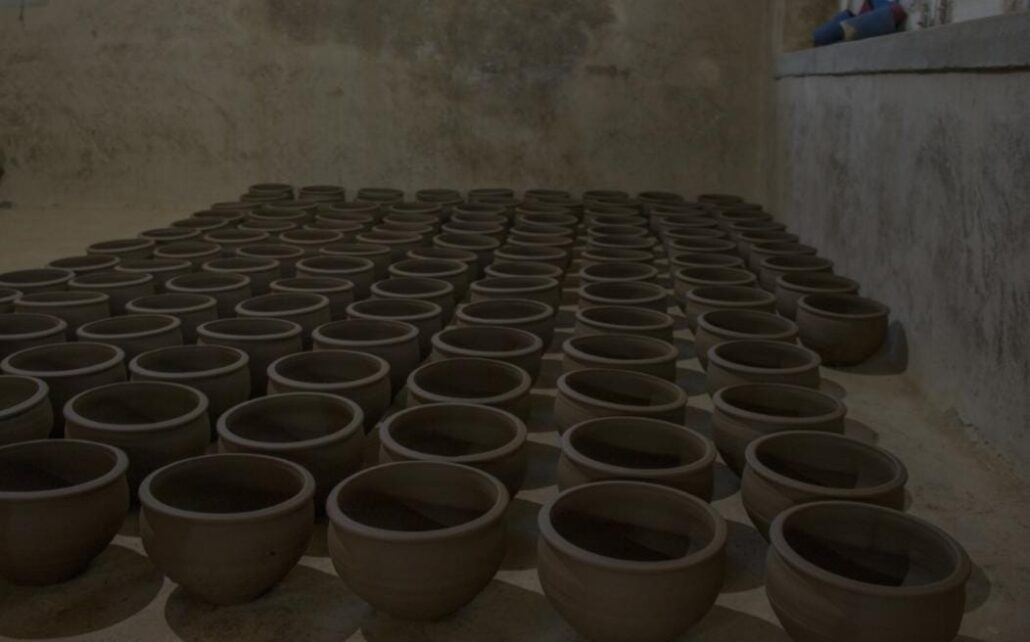
Umar Farooq
Pottery is one of the professions that have suffered the most in the Kashmir valley with the advent of free market. The Kashmir Valley is a place which is known for its traditional arts and crafts and pottery happens to be one of the eminent crafts.
Each day, as the valley steps into a new day, the clay-made utensils find it hard to make place in daily usage, as people prefer plastic or steel utensils these days.
Not only has this changed the traditional lifestyle in the Kashmir valley, but has also left the traditional potters, who carried forward their ancestral legacy of pottery to struggle for a living.
The Kashmiriyat talked to a professional potter, Abdul Khaliq, who might be the last one in their ancestral lineage to carry forward the profession.
(Photograph by Umar Farooq For The Kashmiriyat
Abdul Khaliq Kumar (75), a resident of Gulfkral, Tral said while talking to The Kashmiriyat, “Pottery has been an ancestral occupation of our family since ages. Hence, I’ve done this job since I was a child.”
Talking about the products that sell the most, he said, “If we talk about the demand of these pottery products in the market, nowadays, we make earthen pots that are used in Kangris (firepot) and Tumbhaknaris (a Kashmiri musical instrument). These products are in demand in the market right now and are the main source of income for us today.”
He also told us the products that would be of regular usage in Kashmiri households, but are not anymore. Abdul Khaliq said, “The products that have stopped selling off are glass, plates, a pot that was used for storing water, frying pan and the pots that were used for storing curd. We do not make these products anymore. With the passage of time, copper and steel vessels that were introduced have been heavily used. Due to this reason, our products have stopped selling off.”
“We are not involved in any other job or occupation besides pottery. Our household runs on this, alone. There’s no source of income besides this,” he added.
“We, somehow, have been able to manage bread and butter with pottery, but with the rising inflation, it has become difficult for us to manage family expenses,” Kumar said.
“We don’t receive any support from the government either. No government scheme has been introduced so that those from our profession are able to sustain livelihood. If the government doesn’t pay attention to pottery, we will witness that with the passage of time, pottery will die altogether,” he added.
“We are involved with traditional pottery because we are doing it right from our ancestral times,” he further added.
We also talked to Abdul Khaliq’s son, whether he would carry forward the legacy of his ancestors.
Nisar Ahmad Kumar (23), son of Abdul Khaliq Kumar told The Kashmiriyat that carrying on with the ancestral profession was out of question. “We can’t carry on with this work in the times of rising prices in the market.”
“The products that we are selling right now, have a very low market value and we are unable to meet our needs. That is why we are not interested in doing this job anymore,” he added.
“The market price of the earthen pot that we make for Kangris is ₹10 to ₹20, while the final price of a Kangri is around ₹230 to ₹260, only. And of this amount, we only get ₹10 to ₹20,” Nisar told The Kashmiriyat.
Nisar further said, “Though earthen pot has a main role in Kangri, we get lesser amount of money. That’s why we can’t carry on with this work unless we get some governmental support.”
Nisar says the work requires a lot of hard work and that the profit is very little. “We are unable to fulfil our needs. Therefore, I am currently working as an electrician. I have left the traditional job of our family and I have completed ITI as an electrician after completing my matriculation.”
Another professional potter, Ghulam Ahmad Kumar (80), a resident of Gulfkar told The Kashmiriyat, “I am almost 80 years old right now. I have stopped doing pottery because I am old now.”
“My son, Nazir Ahmad Kumar (35), had to take this legacy forward. He completely refused to carry on with this job because he doesn’t see any future in this profession. My son preferred to work as a laborer instead and putting halt at our ancestral job,” he added.
“I am very regretful that we are not able to carry on with our ancestral job,” he said.
“We never got any government support, otherwise we would have continued doing this work so the legacy of our ancestors remained alive,” he said.
